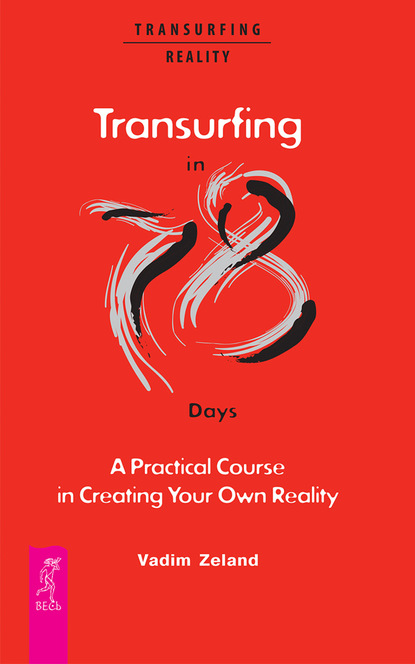
Полная версия
Reality Transurfing: steps 1-5
Whatever exculpatory slogans are used to justify war and revolution, in essence, the motivation is the same; the battle for adherents. The form the battle takes may differ but its one goal is to win over as many adherents as possible. New force is a vital necessity for the pendulum, for without it the pendulum’s sway would stop entirely. The battle of the pendulums is an inevitable struggle for survival.
Once the wars and revolutions are over, other less aggressive but nonetheless tough forms of battle continue, such as the battle for market control, competition between political parties, all kinds of marketing, advertising campaigns, ideological propaganda, and so on. Human society is totally based on pendulums, so all fields of activity are gripped with competition. The rivalry goes on at all levels, from public debate to competition between club teams and individuals.
Things that are new, unusual or strange always have a hard time carving out their niche and not only because of inertia in people’s thinking. The main reason for this is that it is not profitable for the old pendulums to support the appearance of a novice, who would distract its devotees. For example, internal combustion engines which so contaminate the atmosphere of our cities could have been relegated to the past a long time ago. After all, a number of alternative, ecologically friendly engine models have long been developed. The problem is that they threaten the downfall of the oil corporation pendulums, and for the time being these hold too strong a position to allow some inventor to wipe them from the stage. These monsters literally buy up the patents for new engine models and keep them secret at the same time declaring them to have low levels of efficiency.
Implementing its structure on a material level, the pendulum strengthens its position via financial means, facilities, equipment, and of course, human resources. The pendulum places its favourites at the top of the human pyramid. The favourites are made leaders at all levels, starting with low level managers and continuing up to heads of state and they are generally not required to have any particularly outstanding qualities. As a rule, those adherents become leaders whose qualities best fit with the structure of the pendulum. To the favourite it might appear that he has achieved impressive results in his life solely on individual merit. To some extent this may be true, but most of the work in promoting favourites is performed by the self-organizing structure of the pendulum. If a favourite’s parameters fail to meet the requirements of the system, they will be ruthlessly eliminated.
The pendulum battle is destructive to its followers because they think they are acting on personal conviction when in fact they are following the will of another entity. In the majority of cases, the personal conviction of the devotees is taken over by the pendulum. As soon as a person attunes to the pendulum’s frequency an interaction begins to take place between them on an energetic level. The frequency of the devotee’s thought energy is stabilized and supported by the energy of the pendulum. A kind of lock-on takes place, and the adherent is trapped in a feed-back loop. The adherent radiates energy to the resonance frequency of the pendulum which in turn, feeds a little energy to the devotee thereby maintaining its influence over them.
On the material level this is an everyday standard scenario. For example, the pendulum of a political party conducts an election campaign, attracts a new devotee and gives them a little energy in the form of positive feelings like righteousness, satisfaction, dignity and importance. The adherent thinks they are in control of the situation and still able to choose their affiliation whereas, in truth, the devotee was chosen, and control established over them, not the other way around. The adherent only appears to be acting according to their own will when in fact it is the pendulum that is artificially and unnoticeably manipulating the will of the adherent. The adherent enters the pendulum’s information field, socializes with like-minded others on important topics and establishes an energetic connection with them, and in this way becomes consistently attuned to a certain vibration. Later, the adherent may begin to feel that the pendulum has not lived up to their expectations and they begin to have doubts about their former idol. When this happens the frequency of the adherent’s thought energy falls out of the pendulum’s loop. The tightness of the pendulum’s grip varies depending on its power. In some cases the devotee is simply allowed to leave. In other cases the heretic may pay with his freedom or even his life.
A pendulum gets a firm grip on the frequency of an adherent’s thought energy by dominating it. It is like when you are humming a little tune to yourself but become aware of some other loud music being played nearby. The loud music dominates your senses, making it extremely difficult to stay focused on your own tune.
For the purposes of Transurfing it does not actually matter too much how interaction occurs on an energetic level between the pendulum and the devotee. We will examine the nature of the interaction using a simplified model. No-one can explain precisely how something really happens because at that level of questioning one has to ask what is meant by ‘really’ and the questions and speculation continue with the infinite process of learning. This is not what we are interested in here so will make do with simplified models and metaphors that serve our purpose, satisfied with the fact that we are at least capable of understanding some things. Now we will look at how pendulums manipulate their adherents.
Puppet Strings
Pendulums are very good at coercing their adherents to give up energy voluntarily. A large, powerful pendulum, for example, can force its adherents to act according to a certain set of rules. Weaker pendulums go about things slightly differently. When an individual lacks the power to force another to do something they turn to other methods such as reasonable argument, persuasion and promises. These are feebler methods unique to a human society that has divorced itself from the forces of nature. Sometimes pendulums will use these techniques as well but they also have a much more powerful weapon at their disposal. Pendulums are energy-beings, and so they function in accordance with the immutable laws of the universe.
The individual gives their energy to the pendulum when their thought energy is radiating at the same resonance frequency. A person does not have to be consciously sending thoughts to benefit the pendulum. As you know, most human thought and action originates in the realm of the unconscious. The pendulums make use of this feature of the human psyche. They manage to get energy not only from their adherents but also from their ardent opponents. You have probably already guessed how.
Imagine a group of old ladies sitting on a bench criticizing the government. They are obviously not adherents of the government pendulum. They hate it for a number of reasons. However, what happens is that the old ladies criticize the government for being so inept, corrupt, cynical and stupid and in so doing they emit intense thought energy at the frequency of the pendulum. It does not matter to the pendulum which side you rock it from. It can use both positive and negative energy just as long as that energy is resonant with its own.
The pendulum’s main task is to engage people in any way possible in order to occupy their thoughts. With the advent of mass media the pendulums’ techniques have become more sophisticated, and a person can become highly dependent. You have probably noticed that news programs are usually dominated by bad news evoking strong emotions: anxiety, fear, resentment, anger and hatred. The task of the journalists and correspondents is to attract attention. The media, being pendulums themselves, stand in service to yet more powerful pendulums. Their declared aim is free access to all information but their true singular goal is to attune people’s thoughts in all ways possible to the desired frequency.
One of the pendulums’ favourite ways of gaining access to your energy is to throw you off balance. Once you have lost a sense of your own equilibrium you start to ‘wobble’ at the same frequency of the pendulum, thereby enabling it to sway more strongly. Let us say, for example, that prices have risen. You react negatively, become resentful, complain, and exchange information with your friends. This is a natural and even proper response, but it is also exactly what the pendulum is expecting. You radiate negative energy into the world at the frequency of the pendulum. It receives the energy, swings harder, and the situation is aggravated.
The strongest string the pendulum can pull you with is fear, the most ancient and powerful of human emotions. It does not matter what exactly you are afraid of. If the fear is associated with any aspect of the pendulum it will receive your energy. Anxiety and worry are weaker emotions but still relatively effective puppet strings. These feelings are excellent at attuning thought energy to the frequency of a pendulum. If you are concerned about something you find it hard to focus on anything else.
The feeling of guilt is also one of the most extensive of channels through which the pendulum can pump your energy. Guilt is imposed on us from childhood and it is a convenient method of manipulation. “If you are guilty you must do what I say.” Guilt is hard to live with and so people try to get rid of it either via punishment or righting the wrong they have done. Both imply submission, obedience and a certain thought pattern. A sense of duty is a special type of guilt. To owe something means that you are in some way guilty and therefore obliged to do something. As a result, the guilty—both the truly guilty and the falsely accused—wander around with their heads hung low, paying tribute to the pendulum in the form of energy. An induced, conditioned sense of guilt is the favourite weapon of any manipulator, and we will return to this theme later.
It is also worth mentioning the various psychological complexes people have. In the case of an inferiority complex the thoughts people have are: I’m not good-looking; I have no skills or talents; I’m not intelligent or sharp enough; I don’t know how to communicate with people; I’m not worthy. In the case of a guilt complex the thoughts are: I have done something wrong; everyone is judging me; I must carry my cross. In the warrior complex the thoughts go along the line of: I have to be cool; I declare war on myself and all around me; I will fight for my place under the sun; I claim my power. The thoughts of someone with the truth-lover complex go along the lines of: I’ll prove at any cost that I am right and prove to others that they are wrong. These and other complexes are the personal keys to the energy of different individuals. The pendulum strikes a chord and begins intensely draining that person’s energy.
The list of strings the pendulum uses to control its puppets goes on: justice, pride, ambition, honour, love, hate, greed, generosity, curiosity, interest, hunger, and other feelings and needs. Feelings and interests allow a person’s thoughts to be directed in a certain way. If a theme evokes neither interest nor emotion, then it is very difficult to focus on. Pendulums wound a person’s feelings or play on their needs in order to capture a flow of thought energy.
As a rule, people react in uniform ways to external negative stimulus. Bad news evokes discontent. Worrying news evokes anxiety and fear. Insult evokes animosity, etc. Habits also serve as a trigger for the clamping mechanism such as the habit of getting irritated or anxious over nothing, responding to provocation and responding negatively to negative stimulus in general. A person can be aware of the fact that negative thoughts and actions lead to no good but continue to make the same old mistakes out of habit.
Habits often create problems and cause a person to act ineffectively and yet it is difficult to get rid of them. Old habits are an illusion of comfort. People have more trust in things that are long familiar. Everything that is new causes some concern. The old is familiar and has already been tested through experience. It is like the old chair in which you sit down to relax after work. Maybe a new one would be more convenient, but the old one is still more comfortable. Comfort is characterized by notions such as convenience, trust, positive experience and predictability. The new possess these qualities to a much lesser degree, so it takes time for a new habit to become an old habit.
So, we have looked at the methods pendulums use to influence people. The question arises as to whether a person can escape the influence of a pendulum and we will talk about ways of freeing oneself from the association with a pendulum later on. Sometimes a person will openly take a stand against a pendulum that has been controlling them but the individual is always defeated because their position is so isolated. No one individual can change anything. If a person has escaped the grip of obligation and entered into a battle with a pendulum they will only waste their energy, at best being thrown out of the system, and at worst being more aggressively squashed. An adherent that takes it upon themselves to break the rules established by a pendulum may find themselves beyond the law. On the surface of things it looks as if the former adherent is being punished for their protest but in actual fact punishment is delivered because the adherent is no longer submissive enough to continue being a source of energy.
We say that ‘a fault confessed is half redressed’ because a person who has acknowledged their guilt is willing to subjugate themselves to the power of the pendulum. The pendulum is not interested in the adherent’s remorse for their actions. It is only interested in restoring lost control. A pendulum will instantly become kinder if you allow it to manipulate you. If the accused refuses to repent they can be got rid of because nothing more can be gained from them. If they do repent the pendulum’s true motives are usually veiled behind moral principles saying that a person who has shown remorse cannot be such a villain after all. You can easily differentiate between true moral principles and the hidden interests of the system if you keep in mind what the pendulum really represents and what its true goals are.
You Get What You Do Not Want
As illustrated above, a pendulum can be powered both by its supporters and its opponents. Loss of energy on behalf of an adherent is just half the story. If a pendulum is sufficiently destructive it can damage a person’s welfare and future.
Everyone is confronted with negative information or a challenging event at some time of another. Bad news and unfortunate events are provocation on the part of the pendulum. People obviously do not want to have this negativity in their lives, but generally speaking they always respond in one of two ways. If the information they receive is not too hurtful they let it go and it is quickly forgotten. If the provocative information is annoying or frightening, i.e. touches a chord in a person’s soul, then their mental energy is captured in the pendulum’s loop and the person is attuned to the resonance frequency.
Events then unfold fairly predictably. The person gets angry, worried and afraid, expresses their upset in an agitated fashion, and in general, actively radiates energy at the frequency of the destructive pendulum. Not all the negative energy is harvested by the pendulum. Some of it radiates out to sectors in the alternatives space that correspond to the quality of the person’s thought energy which facilitates a shift to a life line where what the person would rather avoid is to be found in excess. If you remember, when a person’s thought energy is attuned to a certain frequency, they shift to a corresponding life line. A pendulum ensnares a person’s thought energy holding it at a certain frequency. This is what is so destructive about the role of a pendulum.
For example, generally we let information about accidents and disasters pass us by. If we are not directly affected, why upset ourselves unnecessarily? As a rule, when you hear the news, a disaster is taking place somewhere in the world but you are on a life line where you play the role of witness rather than victim. The line on which you are the victim is somewhere further away. Conversely, if you allow yourself to take on board information about disaster and misfortune and discuss it with friends, it is quite possible that you will soon shift to a life line where you may well end up in the role of the victim.
The stronger your desire to avoid something, the more likely it is that you will encounter it. To actively fight against what you do not want in your life is to make every effort to ensure that it is present in your life. You do not have to take any specific action to shift onto undesired life lines. It is enough to think negative thoughts and then fertilize them with emotion. When you do not want there to be bad weather you think about how much you dislike rain. Noisy neighbours wear you down and you end up arguing with them all the time or silently hating them. You are afraid of something and the fact greatly concerns you, or you have had enough of your present job and savour your dislike for it.
Everywhere you are pursued by exactly the very thing you do not want, that you fear, hate or despise. There may be other things that you would also like to avoid, but because you are not investing any negative emotion into them they do not appear in your life. Once you let the thing you do not want into your life, associate feelings of hostility with it, and indulge in those feelings, it will instantly become a physical reality within your life layer.
The only way to eliminate the things you do not want from your life is to break free from the influence of the pendulum that has seized your thought energy and from then on, avoid responding to its provocation or getting pulled into its game. You can free yourself from a pendulum’s influence in two ways by defeating it or by stopping its sway. We will look more closely at how this can be done below.
Defeating the Pendulum
Trying to battle with a pendulum is futile. As was explained above, when you battle with a pendulum you just end up supplying it with energy. The first and most important condition for successfully defeating a pendulum is to refuse to get into conflict with it. Firstly, the more actively you try to fight off pendulums that get you down the more they will pressure you. You can repeat endlessly: “Leave me alone! Get away from me!” and think you are fighting them off, but actually, you are just providing them with energy making them cling to you even more.
Secondly, you do not have the right to judge or change anything. Everything you see and experience should be accepted as if they were paintings on display, whether you like them or not. There may be many paintings in an exhibition that are not to your taste but it would never occur to you to demand that they be removed from the exhibition room. Once you have recognized the pendulum’s right to exist, you also have the right to leave it behind remaining free of its influence. The main thing is not fight it, judge it, get angry, or loose your self-control because by doing so you agree to play the game. The pendulum should be calmly taken for granted as a necessary evil and left at that. Any position of opposition supplies the pendulum with energy.
Before you can fully understand what it means to choose, you have to know how to decline. Most people have a vague idea of what they do want but know exactly what they do not want. In an effort to get rid of things or events that they do not want in their life, people act in a manner that has the opposite effect. To decline something you have to first accept its existence. The word “accept” in this context does not mean to embrace something and let it into your personal space. It means simply to recognize its right to existence and then pass by indifferently. To accept and let go of something means to consider the meaning of something and let it pass, waving goodbye as it leaves. This is much more effective than letting something into your personal space, becoming attached to something and then trying to oppose it.
When you think about the things you do not want, you attract them further into your life. Imagine a person who detests apples. Rather than simply paying them no attention it irritates the person that apples exist at all. On a material level they get annoyed every time they see an apple and openly express their disgust. On an energetic level the person may as well be hungrily pouncing on apples, stuffing their mouth and chomping loudly screaming about how much they hate apples, stuffing their pockets, only to be sick and once again complain about how they just cannot stomach apples. What the person does not realize is that they could simply delete apples from their experience of life.
It does not matter whether you love or hate. If your thoughts are latched onto the object of your emotions your thought energy will be attuned to a certain frequency and you will end up caught by a pendulum and transferred to a corresponding life line where the object of your fixation is present in abundance.
If you want to eradicate something from your life all you have to do is stop thinking about it, pass it by with indifference and it will disappear. To eliminate something from your life, ignore it, do not avoid it. There is a difference. When you avoid something it means you have let it into your personal space but are now actively trying to get rid of it. To ‘ignore’ something means not to react to it and consequently not to experience its presence in your space.
Imagine that you are a radio. If your day to day life is like waking up every day listening to a radio programme that you hate all you have to do is tune in to a different frequency!
You might think that you can protect yourself from unwanted pendulums by putting up iron boundaries between yourself and the world but this is an illusion. Putting on protective armour is like saying: “I am a blank wall. I see nothing; I hear nothing; I do not know anything. I won’t talk to anyone. I am unavailable.” It requires a huge amount of energy to support this kind of protective field.
A person who deliberately isolates themselves from the world will find themselves in a constant state of tension. Aside from that, the energy of their protective field will be vibrating at the same frequency as the pendulum against which their defence is directed. This is exactly what the pendulum wants. The pendulum does not care whether you provide it with your energy willingly or not. True protection from a pendulum is to be found in emptiness. If I am empty there is nothing for the pendulum to hook onto. There is no point in playing a game with a pendulum or trying to protect yourself from it if it can simply be ignored. When you can ignore the pendulum its energy will pass by you, dissipating into space without causing you any harm. A pendulum cannot push your buttons or upset you if you are empty in relationship to it.
The pendulum’s principal objective is to attract as many adherents as possible and reap their energy. If you ignore the pendulum it will leave you alone and switch its focus to others who can be drawn into the game and attuned to the necessary resonance frequency.
A basic example of this would be a dog that starts following you and barking loudly. If you turn round to face the dog it will bark even louder and yet if you take it seriously and start trying to dodge it or fight it the dog will follow you for a long time just because it wants someone to lock horns with. If you ignore the dog from the outset it will simply switch its attention to someone else and will not be at all offended that you paid it no attention. The dog is too absorbed in its goal of sourcing energy to think about anything else. The dog is a metaphor. It could be a person or trouble maker of some kind. The principle is the same.
If someone is getting to you, see whether the model of the destructive pendulum fits that person. It will probably be a perfect match. If you cannot deal with the situation choose not to react to provocation. Ignore the person totally because whilst they are getting your energy they will not leave you alone. When you get into a conflict with someone or hate them in passive silence you are directly giving them your energy. To stop giving away your energy means to stop thinking about them altogether; to erase them from your mind. When you can say to yourself: “They’re not worth it!”, and really mean it that person will disappear from your life.













